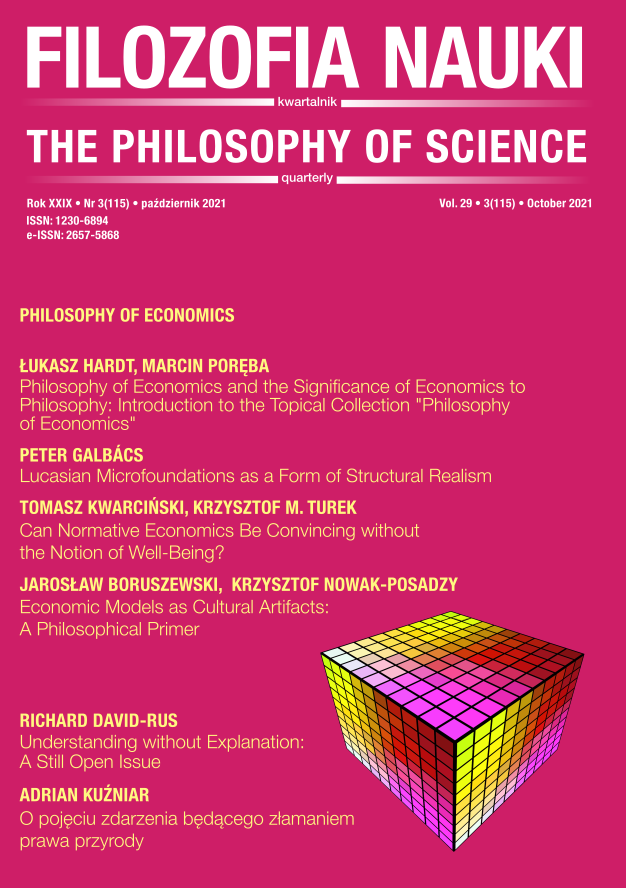Understanding without Explanation: A Still Open Issue
DOI:
https://doi.org/10.14394/filnau.2021.0009Słowa kluczowe:
scientific understanding, understanding without explanationAbstrakt
This paper takes a stance in the debate concerning scientific understanding. It claims that the case for a specific type of understanding, understanding without explanation (UwE), is still open, despite the tendency in the current literature that might suggest otherwise. The paper begins by situating the distinction between an explanatory and non-explanatory understanding in the debate on understanding by introducing Lipton’s account of UwE. The paper then discusses the significance of Lipton’s proposals for the debate and argues that Kelp’s interpretation does not exhaust the challenge they pose to any theory of understanding. The paper then examines the best articulated critique of Lipton’s account provided by Khalifa and rejects it as inadequate. It ends by sketching out a list of positive reasons that support the continued examination of UwE.
Bibliografia
de Regt H. W., Dieks D. (2005), “A Contextual Approach to Scientific Understanding,” Synthese 144(1), 137-170. https://doi.org/10.1007/s11229-005-5000-4
de Regt H. W., Leonelli S., Eigner K (2009), Scientific Understanding: Philosophical Perspectives, Pittsburgh: University of Pittsburgh Press. https://doi.org/10.2307//j.ctt9qh59s
de Regt H. W., Gijsbers V. (2017), “How False Theories Can Yield Genuine Understanding” [in:] Explaining Understanding: New Perspectives from Epistemology and Philosophy of Science, S. Grimm, C. Baumberger, S. Ammon (eds.), New York–London: Routledge, 50-76.
Dellsén F. (2018), “Understanding in Epistemology and Philosophy of Science: A Complicated Relationship,” Metascience 27, 195-198. https://doi.org/10.1007/s11016-018-0293-3
Echeverria J. (1995), “The Four Contexts of Scientific Activity” [in:] Theories and Models in Scientific Processes, W. E. Herfel, W. Krajewski, I. Niiniluoto, R. Wójcicki (eds.), “Poznań Studies in the Philosophy of Sciences and Humanities” 44, 151-167.
Friedman M. (1974), “Explanation and Scientific Understanding,” Journal of Philosophy 71, 5-19. https://doi.org/10.2307/2024924
Grimm S. R., Baumberger C., Ammon S. (2017), Explaining Understanding: New Perspectives from Epistemology and Philosophy of Science, New York–London: Routledge.
Hempel C. G., Oppenheim P. (1948), “Studies in the Logic of Explanation,” Philosophy of Science 15(2), 135-175. https://www.journals.uchicago.edu/doi/10.1086/286983
Hempel C. G. (1965), Aspects of Scientific Explanation and Other Essays in the Philosophy of Science, New York–London: The Free Press & Collier-Macmillan.
Hoyningen-Huene P. (1987), “Context of Discovery and Context of Justification,” Studies in History and Philosophy of Science Part A 18(4), 501-515. https://doi.org/10.1016/0039-3681(87)90005-7
Kelp C. (2015), “Understanding Phenomena,” Synthese 192(12): 3799-3816. https://doi.org/10.1007/s11229-014-0616-x
Khalifa K. (2012), “Inaugurating Understanding or Repackaging Explanation?,” Philosophy of Science 79(1), 15-37. https://www.journals.uchicago.edu/doi/10.1086/663235
Khalifa K. (2013), “The Role of Explanation in Understanding,” British Journal for the Philosophy of Science 64(1), 161-187. https://doi.org/10.1093/bjps/axr057
Khalifa K. (2017), Understanding, Explanation, and Scientific Knowledge, Cambridge: Cambridge University Press.
Kitcher P. (1981), “Explanatory Unification,” Philosophy of Science 48(4), 507-531. https://www.journals.uchicago.edu/doi/10.1086/289019
Kvanvig J. (2003), The Value of Knowledge and the Pursuit of Understanding, Cambridge: Cambridge University Press. https://doi.org/10.1017/CBO9780511498909
Lipton P. (2009), “Understanding without Explanation” [in:] Scientific Understanding: Philosophical Perspectives, H. W. de Regt, S. Leonelli, K. Eigner (eds.), Pittsburgh: University of Pittsburgh Press, 43-63.
Riggs W. (2003), “Understanding Virtue and the Virtue of Understanding” [in:] Intellectual Virtue: Perspectives from Ethics and Epistemology, M. DePaul, L. T. Zagzebski (eds.), Oxford–New York: Clarendon Press, 203-226. https://doi.org/10.1093/acprof:oso/9780199252732.003.0010
Salmon W. (1984), Scientific Explanation and the Causal Structure of the World, Princeton: Princeton University Press. https://doi.org/10.1515/9780691221489
Salmon W. (2006), Four Decades of Scientific Explanation, Pittsburgh: University of Pittsburgh Press. https://doi.org/10.2307/j.ctt5vkdm7
Schurz G., Lambert K. (1994), “Outline of a Theory of Scientific Understanding,” Synthese 101(1), 65-120. https://doi.org/10.1007/BF01063969
Strevens M. (2013), “No Understanding without Explanation,” Studies in History and Philosophy of Science Part A, 44(3), 510-515. https://doi.org/10.1016/j.shpsa.2012.12.005
Trout J. D. (2002), “Scientific Explanation and the Sense of Understanding,” Philosophy of Science 69(2), 212-233. https://www.journals.uchicago.edu/doi/10.1086/341050
Woodward J. (2003), Making Things Happen: A Theory of Causal Explanation, New York: Oxford University Press. https://doi.org/10.1093/0195155270.001.0001
Zagzebski L. (2001), “Recovering Understanding” [in:] Knowledge, Truth, and Duty: Essays on Epistemic Justification, Responsibility and Virtue, M. Steup (ed.), New York: Oxford University Press, 235-252. https://doi.org/10.1093/0195128923.003.0015



















 Filozofia Nauki | ISSN 1230-6894 | e-ISSN 2657-5868
Filozofia Nauki | ISSN 1230-6894 | e-ISSN 2657-5868